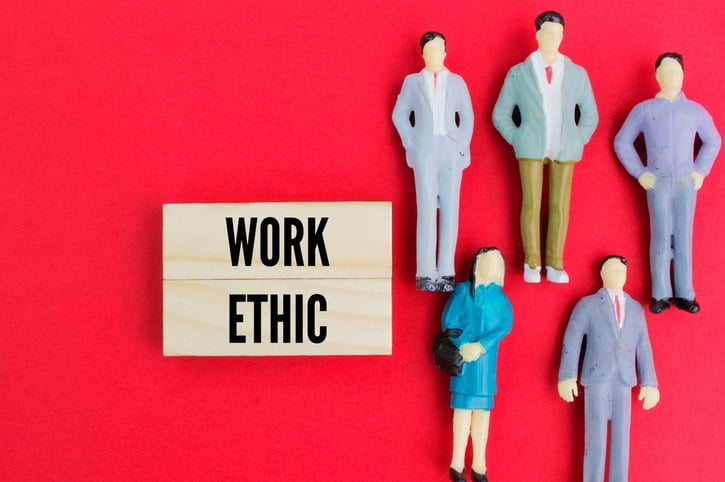What is work ethic?
Work ethic refers to the values, attitudes, and behaviors individuals bring to their work.
It encompasses their dedication, discipline, and commitment to perform their job responsibilities to the best of their abilities. A strong work ethic reflects an individual's integrity, professionalism, and reliability.
Work ethic is not limited to a particular industry or role; it is a universal trait contributing to individual and organizational success.
Qualities of good and poor work ethics
Examining the qualities associated with good and poor work ethics is essential to understand work ethics better. Let's delve deeper into these qualities and explore the differences between them:
Good work ethic
-
High-Quality Work: Employees with a strong work ethic consistently produce work of high quality. They pay attention to detail, take pride in their work, and strive for excellence. Their work reflects their dedication and commitment to delivering the best results.
-
Ethical Behavior: Ethical behavior is fundamental to a good work ethic. Employees with strong work ethics adhere to moral principles and demonstrate honesty, integrity, and respect in their interactions with colleagues, clients, and stakeholders. They make ethical decisions, maintain confidentiality, and uphold the highest standards of professionalism.
-
Positive Attitude: A positive attitude is contagious and contributes to a healthy work environment. Employees with a strong work ethic approach their tasks and challenges optimistically and enthusiastically. They embrace a can-do mindset, maintain a solution-oriented approach, and inspire others positively.
-
Responsibility: Responsibility is a key characteristic of a good work ethic. Employees take ownership of their tasks, meet deadlines, and fulfill their obligations. They are accountable for their actions and are reliable team members who can be counted on to deliver results.
-
Timeliness: Being punctual and respecting deadlines is another important quality of a good work ethic. Employees with strong work ethics understand the value of time and the importance of meeting commitments promptly. They prioritize their work, manage their time efficiently, and complete tasks within timeframes.
-
Exceeding Expectations: Going above and beyond the minimum requirements is a hallmark of a good work ethic. Employees with strong work ethics consistently seek to exceed expectations. They proactively look for ways to improve processes, suggest innovative ideas, and take on additional responsibilities to deliver exceptional results.
Poor work ethic
-
Laziness: Laziness is a detrimental trait associated with a poor work ethic. Employees with poor work ethics may lack motivation, procrastinate, and avoid taking initiative. They often look for shortcuts or the minimum effort required to get by, negatively impacting their productivity and overall team performance.
-
Lack of Commitment: Employees with poor work ethics lack commitment to their roles and responsibilities. They may frequently miss deadlines, show a lack of interest in their work, and fail to fulfill their obligations. Their lack of dedication and commitment can lead to project delays, lower quality outputs, and hinder team collaboration.
-
Inconsistent Performance: Inconsistent performance is a red flag of a poor work ethic. Employees with poor work ethics may have periods of productivity followed by periods of low performance. Their lack of consistency can disrupt workflow, create a sense of unpredictability, and decrease overall team productivity.
-
Negative Attitude: A negative attitude can poison the work environment and impact team dynamics. Employees with poor work ethics may display pessimism, complain frequently, and lack enthusiasm. Their negative mindset can demotivate others and contribute to a toxic work culture.
-
Disregard for Deadlines: Employees with poor work ethics often fail to prioritize deadlines or underestimate the importance of timely completion. They may consistently miss deadlines or require constant reminders, which can disrupt project timelines and cause frustration among colleagues and supervisors.
When recognizing these qualities, organizations can assess and cultivate a strong work ethic within their workforce, fostering a positive, productive, and successful work environment.
The importance of a strong work ethic

A strong work ethic holds significant value for employers, HR professionals, and small business owners. Here are some key reasons why a strong work ethic is essential in the workplace:
Productivity and efficiency
Employees with a strong work ethic are focused, organized, and committed to meeting deadlines and producing high-quality work.
They take pride in their work and consistently strive for excellence. Their dedication and discipline increase productivity and efficiency, ensuring tasks and projects are completed effectively and on time.
Positive company culture
A strong work ethic contributes to a positive company culture. Employees who embody strong work ethics set a precedent for others and foster an environment of professionalism and dedication.
This creates a supportive and motivating workplace where colleagues inspire and encourage each other to excel.
Enhanced business reputation
Employees consistently demonstrating a strong work ethic instills client confidence and strengthen business relationships.
A reputation for having a workforce with strong work ethics can attract new clients, enhance customer satisfaction, and lead to repeat business.
A positive business reputation is a valuable asset in today's competitive market.
Increased customer satisfaction
Employees with a strong work ethic are committed to delivering high-quality work and meeting customer needs. They strive to exceed customer expectations and ensure customer satisfaction.
Their dedication to providing excellent service and going the extra mile creates positive customer experiences, fostering loyalty and repeat business.
Improved team collaboration
 A strong work ethic promotes effective collaboration among team members. When everyone values hard work, professionalism, and dedication, it creates a harmonious and cohesive work environment.
A strong work ethic promotes effective collaboration among team members. When everyone values hard work, professionalism, and dedication, it creates a harmonious and cohesive work environment.
Employees with a strong work ethic are team players who support their colleagues, share knowledge and contribute to collective success.
Higher standards and accountability
A strong work ethic sets high standards and promotes accountability. Employees take ownership of their responsibilities and hold themselves accountable for their actions and outcomes.
This leads to a corporate culture of personal responsibility, where individuals strive for continuous improvement and take pride in their organizational contributions.
Employee growth and development
A strong work ethic often aligns with a growth mindset. Employees with a strong work ethic are eager to learn, improve their skills, and take on new challenges.
They actively seek opportunities for professional development, contributing to their personal growth and enhancing their value to the organization.
Increased employee morale and job satisfaction
Recognizing and rewarding employees with a strong work ethic boosts morale and job satisfaction.
When employees feel their hard work and dedication are recognized and appreciated, they are likelier to be engaged, motivated, and satisfied in their roles.
This, in turn, leads to higher employee retention rates and a positive work environment.
How to build strong work ethics

Building and fostering strong work ethics within a team or organization requires a proactive approach. Employers and HR professionals can implement strategies to promote and cultivate a strong work ethic. These strategies may include:
Leading by example
Leaders should embody the values and behaviors they expect from their employees. They set a precedent for others to follow by demonstrating a strong work ethic.
Leaders can showcase their commitment to quality, ethics, and professionalism through their actions, decision-making, and communication.
Providing clear expectations
Communicating job responsibilities, performance standards, and behavioral expectations helps employees understand what is required.
When expectations are well-defined, employees better understand how their work contributes to the organization's goals and objectives.
Useful Read: Harnessing the Power of SMART Objectives for Business Growth
Offering training and development opportunities
Investing in employee training and development enhances their skills and reinforces the importance of continuous improvement.
Training programs can focus on technical skills, leadership development, and ethical decision-making, all contributing to a strong work ethic.
Recognizing and rewarding strong work ethics
Acknowledging and rewarding employees who consistently demonstrate a strong work ethic encourages others to do the same.
Recognitions can take various forms, such as public appreciation, bonuses, promotions, or opportunities for growth and development.
Celebrating employees' achievements and contributions reinforces the organization's values and reinforces the importance of a strong work ethic.
Difference between strong and poor work ethics
The distinction between strong and poor work ethics lies in the qualities and behaviors exhibited by employees.
While strong work ethics include high-quality work, professionalism, and a positive attitude, poor work ethics are characterized by laziness, inconsistency, and a lack of commitment.
Employees with strong work ethics take pride in their work, demonstrate accountability, and consistently strive for excellence.
In contrast, employees with poor work ethics may lack motivation, exhibit a negative attitude, and fail to meet expectations consistently.
Benefits of strong work ethics

A workplace culture that values and promotes strong work ethics benefits businesses. These benefits include:
Improved employee morale and job satisfaction
When employees perceive their hard work and dedication are recognized and appreciated, they are more likely to feel motivated and satisfied. This leads to higher levels of engagement, lower turnover rates, and increased loyalty to the organization.
Enhanced productivity and efficiency
Employees with strong work ethics are focused, organized, and committed to meeting deadlines and producing high-quality work.
They take ownership of their responsibilities and proactively seek ways to improve efficiency and effectiveness. This leads to increased productivity, streamlined processes, and higher-quality outputs.
Positive company reputation
A workforce known for its strong work ethic contributes to a positive reputation. Clients, partners, and stakeholders appreciate working with professionals who consistently deliver exceptional results.
A positive reputation attracts top talent, strengthens business relationships, and opens doors to new opportunities.
Team cohesion and collaboration
A strong work ethic fosters an environment of trust, respect, and collaboration among team members.
When employees share common values and a commitment to excellence, they are more likely to work together harmoniously, leverage each other's strengths, and achieve shared goals.
Examples of strong work ethics
To further illustrate the concept of strong work ethics, let's consider a few examples:
A team player
An employee who willingly collaborates with colleagues shares knowledge, and supports others in achieving shared goals demonstrates a strong work ethic. They prioritize the team's success and contribute positively to the work environment.
Exceeding expectations
Going above and beyond the minimum requirements of a task or project showcases an employee's commitment and dedication to delivering high-quality work.
It reflects their initiative, drive, and determination to surpass expectations consistently.
Ethical behavior
Acting with integrity, honesty, and ethical principles in the workplace reflects a strong work ethic. Employees who make ethical decisions, treat others respectfully, and maintain confidentiality demonstrate their commitment to upholding high ethical standards.
Timely manner
Being punctual and meeting deadlines consistently demonstrates a strong work ethic. Employees who value time management, prioritize tasks effectively and deliver work promptly show dedication to honoring commitments and respecting others' time.

Employee scheduling and Time-tracking software!
Conclusion
In conclusion, cultivating a strong work ethic among employees contributes to individual and organizational growth, making it a vital aspect of business success.
Promoting and nurturing a culture that values and rewards strong work ethics is crucial to ensuring long-term success and sustainability in today's competitive market.
Enhancing work ethic with Shiftbase
Having a workforce with a strong work ethic can significantly improve productivity and business success. Shiftbase, a comprehensive workforce management SaaS, can support the cultivation of such an ethic. By streamlining employee scheduling, time tracking, and absence management, Shiftbase allows your team to focus on their core tasks, fostering a sense of responsibility and commitment to high-quality work.
Ready to empower your team's work ethic? Try Shiftbase for free for 14 days and experience a more efficient and harmonious work environment.


 A strong work ethic promotes effective collaboration among team members. When everyone values hard work, professionalism, and dedication, it creates a harmonious and cohesive work environment.
A strong work ethic promotes effective collaboration among team members. When everyone values hard work, professionalism, and dedication, it creates a harmonious and cohesive work environment.




